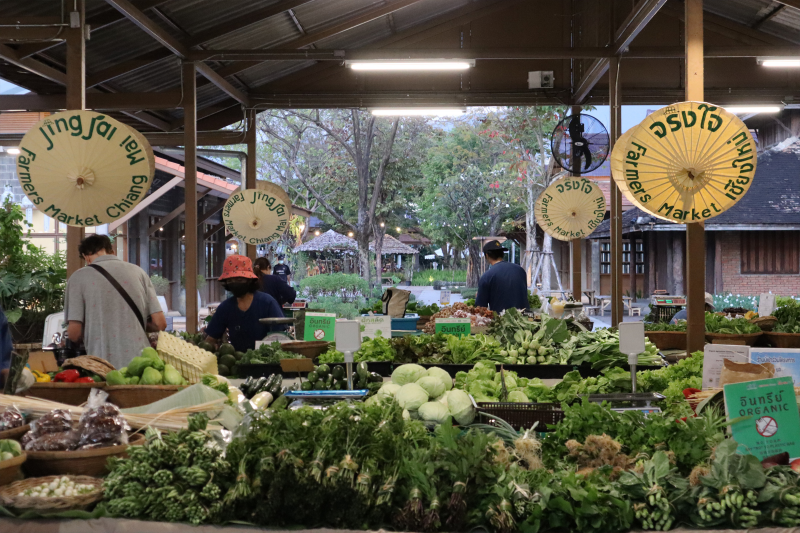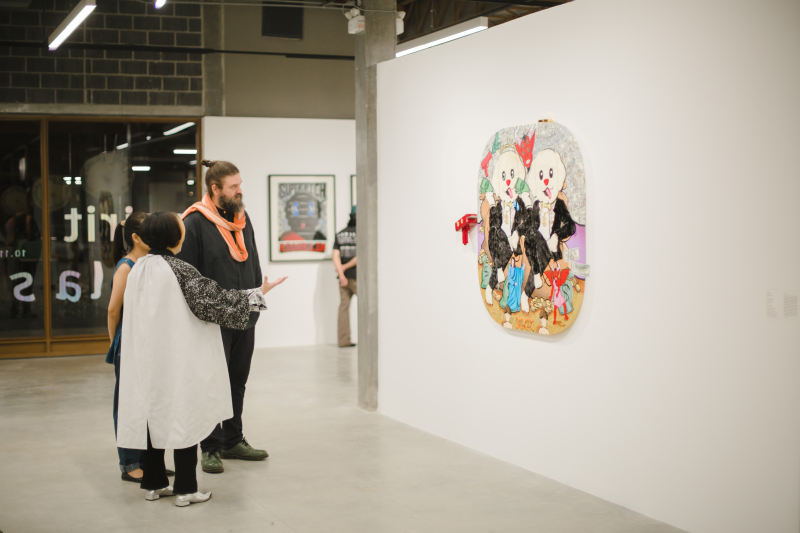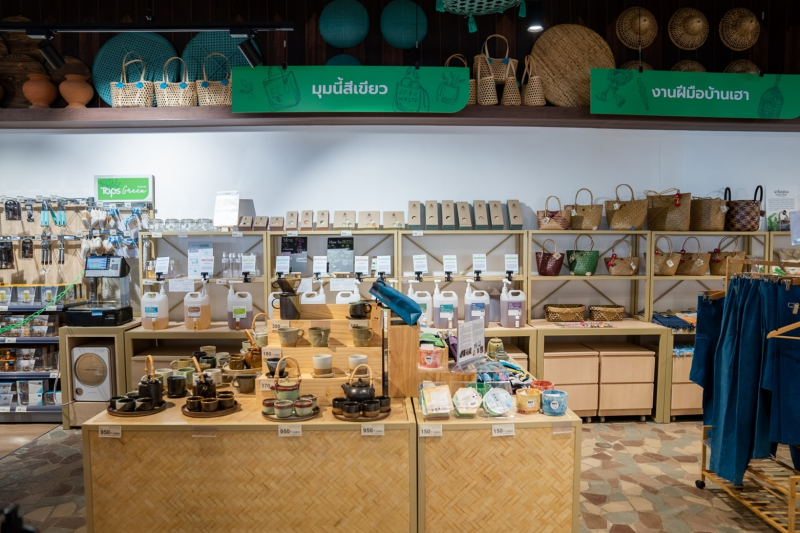
Traveling to seek local experiences is becoming increasingly popular in many countries throughout the world, including Thailand. Chiang Mai has been rated one of the world's most visited cities by major media outlets because of its authentic local character, beautiful surroundings, and culinary traditions. When visiting Chiang Mai, the "Jing Jai Market - in the Jing Jai Central area" is one of the monuments and significant tourist attractions. It is a place of inspiration and happiness in the community. It is also the hub for the greatest organic products, handicrafts and folk arts, creative idea shops, and locally owned eateries that promote environmental consciousness in all its forms. These establishments address ecologically friendly product packaging, environmentally friendly products, recycling, waste separation, etc., while also satisfying the demands of sustainable community tourism.
Pichai Chirathivat, Executive Director of Central Group, stated, “Central Group's mission is to create shared values among people, communities, and the environment, under the project, "Central Tham – Better Together" In order to support farmers and communities in the development of agriculture, handicrafts, and a variety of handmade skills, we initiated the "Jing Jai Market - in the Jing Jai Central" in the heart of Chiang Mai on a 28-rai plot in 2006. It serves as a gathering place and attraction for both locals and visitors to experience the distinctiveness of Thai products from actual farmers who sell them themselves. Immersion in the local culture, replete with the knowledge and charm of Lanna, is possible for visitors here in a refreshing atmosphere amidst an abundance of vegetation. Apart from contributing to the enhancement of the community's quality of life and the growth of a robust grassroots economy, Central Group has also worked to establish Jing Jai Market, a new landmark for tourists from all over the world who are interested in sustainable community tourism. It is consistent with the government's goal of making Chiang Mai a city of health and a world-class tourism destination. From January to November 2023, there were over 1 million tourists visiting "Jing Jai Market"—in the Jing Jai Central—which is expected to expand even more during annual events, major festivals, or tourism seasons. It has resulted in the distribution of income to farmers and communities through more than 400 stores. It is predicted that there will be at least 280 million baht in circulation during 2023, as well as around 1.2 million tourists.”
The "Jing Jai Market" in the Jing Jai Central area is divided into 3 divisions.
1. Jing Jai Market, featuring the following highlights:
1.1 Jing Jai Market
This well-known flea market offers an eco-friendly concept for cuisine, art, design, and handicrafts that visitors can browse, eat, and shop. It is open from 6:30 a.m. to 3:00 p.m. on Saturday and Sunday. There are 2 zones within it.
- Jing Jai Farmers’ Market Chiang Mai Zone: This is the Central Group's first organic and non-toxic fruit and vegetable market, sourced directly from real farmers in Chiang Mai and the surrounding areas. The goal is to promote the consumption of safe, hygienic, and nutritious food and produce that supports local economies. Jing Jai Market has won many honors, including the "Talad-Tongchom Award'' from the Office of Commercial Affairs in the Province of Chiang Mai and the "100% Styrofoam Food Container Free Organization Award'' at the gold level from the Department of Health, Ministry of Public Health, attesting to its potential as a tourist destination. It has been approved as a “Green Market'' by the Ministry of Natural Resources and Environment, which aims to cut down on the use of plastic bags in order to lower greenhouse gas emissions. It is also an audited market for "Safe Fry Oil'' from Chiang Mai Municipality. Jing Jai Farmers' Market Chiang Mai recently won the Creative Excellence Awards 2023 (CE Awards) in the Creative City Awards category, organized by the Creative Economy Agency (Public Organization), reflecting how the region has developed to be harmoniously infused with creativity and connected to local stories.
- Rustic Market Zone: This is Chiang Mai's biggest handmade goods market, and anyone who appreciates art, DIY crafts, and handcrafted goods should definitely check it out. Items produced by independent local artisans, comprising a diverse range of stylistic treasures, are available for purchase, including vintage pieces, collectibles, and home décor items. Visitors can also have coffee and other locally made drinks to stay refreshed. Everyone may unwind and enjoy a good time by sitting in a corner and enjoying the lovely sounds of a live band.
1.2 Cafes, homemade restaurants, idea shops, and craft community
This area features eateries and stores that were designed with creative flair, befitting a friendly gathering place for craft enthusiasts. There is also a family-friendly activity space where members can spend time together engaging in crafts, workshops, and other activities. It is open every Monday to Friday from 8:30 a.m. to 9:00 p.m., and Saturday and Sunday from 6:30 a.m. to 10:00 p.m. (opening and closing hours vary from store to store).
- Here you'll find a variety of shops, including Tops Green, the first green store in Thailand, which was founded on the philosophy of being a "green store for Chiang Mai people, for life, and for a better world." It offers over 1,000 eco-friendly products that are health-conscious and delicious; Good Goods, which is a contemporary-style shop selling local wisdom products; and a unique coffee bar serving aromatic Bhu Chee Deun coffee. It is part of the social entrepreneurship project "Central Tham," with revenues going back into the community.; Be ALLA, an organic skin care goods store; Norapao, a clothing store made from natural fibers; and Slow Stitch Studio, which features indigo-dyed fabrics and natural dyes created using the "Shibori" technique, etc.
- Cafes such as Roastniyom ECO, which is a well-known eco-friendly coffee shop in Chiang Mai, using natural fiber cups and straws.
- Homemade Thai cuisine such as Kiew Kai Ka Jing Jai, a must-try for fans of homemade Thai food that has a northern flavor and is cooked with natural ingredients; Kang Jingjai, the well-known neighborhood eatery that grew from the Kang Vela restaurant; and Il-gus-to, an Italian eatery that primarily serves nearby ingredients.
- Craft communities, stylish boutiques featuring exquisite designs for handcrafted goods, and art studios like Saprang, handmade jewelry, and Pachana Studio, handmade ceramics.
The Jing Jai market is also conscious of conservation and environmental awareness, as evidenced by its 100% no-foam policy, campaigns to encourage customers to use cloth bags (which include a service area where customers can borrow cloth bags), and installation and assistance programs to learn about proper waste separation. Additionally, the market has installed a T.O.B.Y. (turn organic by you) compost and biogas production machine from food scraps, and it has collaborated with Chiang Mai Rajabhat University's Green Road project by utilizing recycled plastic bag road paving blocks to pave certain of the market's roadways. Furthermore, Tops Green's staff uniforms are made from recycled plastic bottle fibers. Additionally, by 2024, a learning center dedicated to upcycling knowledge is to be established through a trial project.
2. Jing Jai Village is a community area where some of the distinctive features of Lanna architecture can still be found. It unites various stores and services, like trendy eateries and cafes with distinctive décor, such as The Baristro at Jing Jai Market, Somtam House, Box Journey, which is an eco-friendly package store, and Baan Lek Lamai, which is a store selling handwoven bags, etc. This includes enabling well-known graffiti artists—both domestic and international—to use the area to produce art for Thailand's first Style Walls festival.
3. Jing Jai Gallery is an area that functions as a venue for art exhibitions, showcasing a wide range of artistic mediums such as art, music, and film. Visitors can go through the rotating displays to get inspiration. It's seen as an additional platform for showcasing and elevating the new generation of Thai artists on the international scene, accessible to audiences of all ages and genders.
Central Group continues to drive society towards sustainability by striving to provide farmers and local communities with stable incomes, job possibilities, and career paths. Come experience the uniqueness of traditional and modern products, both locally produced food and home items, crafted with the genuine intent and sincerity of Chiang Mai's inhabitants. It's an archive of the most amazing moments presented in the form of sustainable community tourism.


